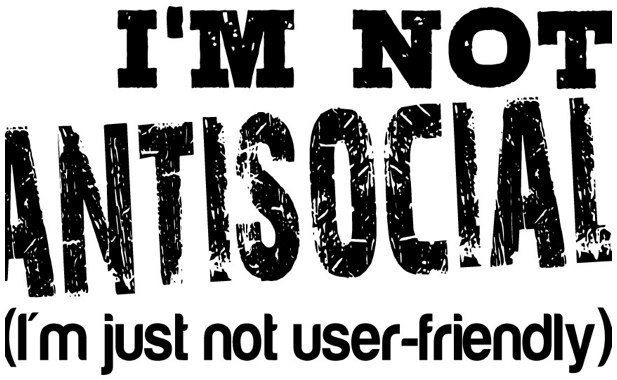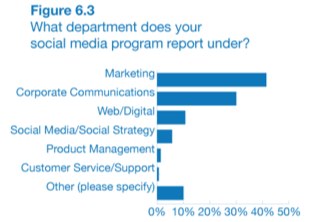I ask with sincerity, is your business antisocial? Take a moment before you respond. I understand you may have Facebook and Twitter presences. Your business may broadcast on YouTube. Perhaps your executives are blogging. If you’re among the more sophisticated organizations, the team is probably subscribing to elaborate monitoring services to listen more effectively. And, with all of the social objects produced inside the organization, it’s come to the point where a content management system or social media management system is necessary to scale.

Social networks usher in a era of transparency and authenticity and these two elements represent the hallmark of your corporate social media program. You are walking the two-way street and you’re already successfully building a community rich with the 3F’s (friends, fans, and followers). How can your business possibly be antisocial?
Antisocial is defined as anything that goes against the laws and customs of society. Facebook, Twitter, and social networks of all shapes, sizes, and focus are thriving societies in their own right. Each produce a unique culture, one that you’re more than familiar with. You are after all a citizen of one or more social networks before you’re a corporate citizen. At a minimum, you as an individual contribute to the culture of each of the societies to which you belong. These are your networks and as a result, you create a personal egosystem. You are at the center of your experiences and as such, the information that finds you, the information you share, and the people with whom you connect are yours to define. These actions contribute to the lifestyle and value of the network and you take pride in the relationships, community and stature you earn.
But when we take a step back to examine many of the leading business examples in social media, it’s clear that many are in actuality, illustrations of traditional marketing masquerading as genuine engagement. Are brands acting as good citizens? Are they contributing to the customs of society or are they taking away from the experience?
If you were to run a quick study of your social activities or those of your favorite brands, you may find that marketing at communities rather than investing in their usefulness is clear and present. Contests, polls, promotions, news releases, and events are balanced by impassive updates or questions. The activity that fills the space between marketing updates are questionable or unconvincing reinforcements of why people are compelled to connect in the first place. The missing value of why people should stay connected creates a void that only expands with every day that passes.
While brands engage with customers in social networks, customers walk away with an experience that is the ultimate judgment of value. Here we are presented with an incredible opportunity to strengthen customers ties. We’re given a well of insight to put into action. We’re presented with a stage to show brand empathy and earn relevance through our actions and words. Are we embracing the opportunities before us or in the end, does our investment equate to traditional marketing in a new interactive design?
The reality is that a significant percent of businesses run social media from the marketing department. According to my Altimeter colleague Jeremiah Owyang, almost 50% of brands he surveyed house social media in marketing. Another 30-40% place social in corporate communications. In these cases, social media is relegated to just that, a function of marketing. Any other corporate approaches to social media are most likely siloed within other business units and as a result, the customer is not offered a holistic brand experience.

New media channels represent a new highway for driving messages and brand stories to desired audiences. But what many fail to realize is that the social consumer represents an intelligent audience with an audience of audiences. They are in control of their experiences and while they may connect with their favorite brands in their network of choice today, without providing value or a constructive engagement, attention spans will wander. Much like banner blindness in digital advertising, individuals will eventually tune-out their favorite brands that fail to demonstrate relevance in their social stream. What’s worse is that eventually they may take the unfortunate action of an unfollow or unlike as they realize that they are in control of curating the quality of their stream. With one click, they will bid farewell to the brands, even those they love, if they don’t introduce value. This is a harsh reality that Andrew Blakeley recently attempted to spotlight. Of the 40 brands he followed on Facebook, only one gave him a reason why he should
The question is, do you know what your customers want from you? It’s an important question to ask. If you’re not contributing to the value of these digital societies, you may unintentionally take away from it.
With all of the excitement around creating a social business, we can only benefit from knowing how to improve the experiences of existing and prospective customers. Otherwise we may be talking more than we really are listening.
It starts with knowing the “why.” Why would a customer Like or Follow your brand today and tomorrow? This “why” should be front and center of all that you do taking into account that customers may expect different approaches from you. Some may need customer service. Others are looking for promotions and deals. Certain individuals prefer access to exclusive content or information. Many are looking for insight, leadership or occasional entertainment. Whatever the reasons are, it’s time to know what your customers want and design social programming around a meaningful engagement.
While each network boasts a unique culture, your organization too is home to a distinct culture that defines the brand. The corporate culture should adapt to coalesce with the way of life in each network. Business units should work together under a common goal of earning customer satisfaction, engagement, and loyalty. This is about earning relevance. This is about demonstrating why someone should connect with you not just today, but every day. Give people a reason. Give people something to talk about…something to think about. Give people purpose, sustenance, and direction. This is not about engagement, but being engaging! In the process, you’ll find that becoming a social business is a function of design, collaboration, and reinforcement, but ultimately it’s a measure of how customers view your brand within these digital societies.
Originally published at BrianSolis.com





 WebProNews is an iEntry Publication
WebProNews is an iEntry Publication